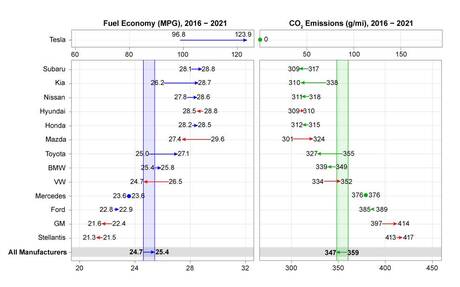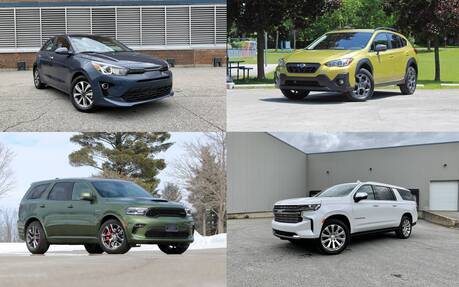New Faces Dominate Latest Fuel Economy Rankings, Old Ones Still Struggle
The U.S. Environmental Protection Agency (EPA) has published its latest Automotive Trends Report, which pretty much has the same observations as a year ago. Mainly, even though vehicles keep getting bigger and more powerful, with pickups and SUVs leading the way, on average they proved more fuel-efficient and cleaner in 2021 than any of their predecessors.
Much of the credit goes to the various advanced technologies introduced by automakers in recent years including cylinder deactivation, auto stop-start, and CVTs or transmissions with extra gears. Also, bigger engines are making room for smaller, turbocharged engines, while the number of hybrid and electric models keeps rising.
- Also: Ontario Extends Fuel Tax Cut For an Additional Year
- Also: Are Fuel Consumption Ratings Good Indicators?
CO2 emissions have decreased 25 percent since the 2004 model year, while fuel economy has increased 32 percent. And that’s despite vehicles collectively having 20 percent more power, 4 percent more weight and a 5 percent larger footprint than back then. As the EPA notes, however, market shifts away from conventional passenger cars and towards SUVs and pickups have offset some of the fleetwide benefits.
Most manufacturers have improved their CO2 emissions and fuel economy over the last five years. The following graph also reveals which ones are the best and the most improved.

Other than Tesla, which only sells fully electric models, the most fuel-efficient automaker is now Subaru. Kia, which made the biggest jump from 2016 to 2021, ranks second. The top five is rounded out by Nissan, Hyundai and Honda, which sat at the top of these rankings last year.
Some of the manufacturers whose average fuel economy and emissions have gotten worse over the past five years include Mazda, Volkswagen, General Motors and Stellantis. Once again dead last, the maker of Ram pickups, Dodge muscle cars and Jeep SUVs continues to emphasize power and performance over efficiency, although it recently announced bold electrification plans for the rest of the decade. Stellantis also led all automakers in buying emissions credits to comply with EPA regulations in 2021.
Ford is not as bad as the other two members of Detroit’s Big Three, but only by a slim margin. Furthermore, while Mitsubishi is not ranked in the EPA report, the Mirage remains the non-plug-in model with the best fuel economy in the entire auto industry with a combined rating of 6.2 L/100 km (according to Natural Resources Canada).
